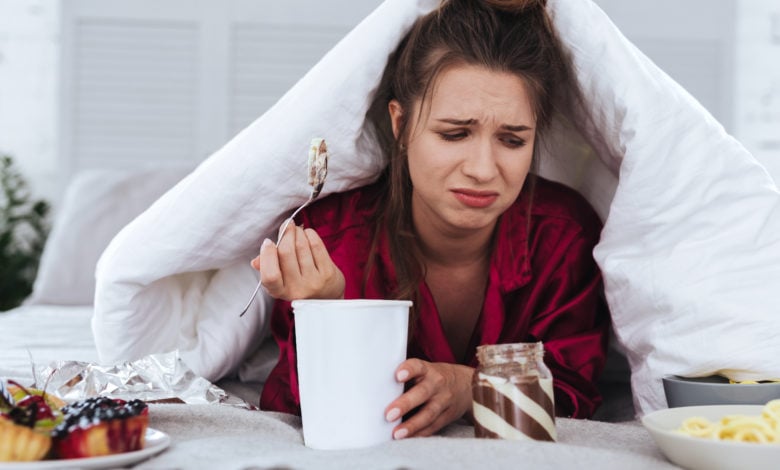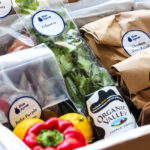Food and Mood: Is Dieting Making Us Depressed?

Have you ever had a healthy and fulfilling meal and felt a lot of natural energy afterwards, and perhaps even an improved mood or decreased sense of anxiety? Or eaten fast food on a “cheat day” and been left with feelings of bloating, fatigue, or even depression?
The foods and ingredients in foods that we eat on a daily basis can have quite an impact on how we feel about ourselves and mood regulation, but often that goes beyond body image and the numbers we see on the scale.
Sometimes the latter can have an additional cascading effect, if we’re making dietary choices that are high in sodium and lacking in nutritional content, we often notice we’re feeling down and gaining weight on top of this.
So can the foods that we eat improve mood, and do certain choices leave us feeling worse, or even anxious and depressed?
If the old adage of “you are what you eat” rings true, the same sentiment should hold true for the mind as well.
Speaking from anecdotal experience and testimonials of other dieters, usually when we’re making healthier food choices, our blood sugar levels are better regulated. This in turn can lead to more stable mood regulation. It only stands to reason that if you eat junk food and sugary foods on a daily basis that your body can’t process or store efficiently, your mood will shift as well.
We wanted to explore different food options that may help improve mood, and foods to avoid if you’re feeling stressed or anxious.
The driving question being, are our minds and moods ever shifting with our shifts in food choices? Is it about the effect these foods have on our weights and self-image alone, or does the alteration in mood start even earlier due to ingredients alone?
Food and Mood: The Best & Worst Choices
In terms of menu and meal choices, there are certain foods that can improve moods, and others that leave us feeling bloated and down (or, at the worst, anxious and even depressed).
Here are some of the best and worst foods to improve mood and combat feelings of depression:
The Best
- Avocados (rich in B vitamins and antioxidants)
- Berries (rich in antioxidants that can sharpen mental performance and Vitamin C to combat stress)
- Cashews (high in Zinc, which may help feelings of anxiety and depression)
- Chamomile tea (can help treat anxiety and insomnia)
- Dark chocolate (rich in antioxidants that can help improve mood)
- Green tea (can help improve concentration and focus)
- Oatmeal (this complex carbohydrate can produce serotonin and improve or stabilize mood)
- Oranges (high in Vitamin C, which can help sharpen the brain and improve mood)
- Turkey (high in tryptophan which can help treat depression and insomnia- this ingredient can also be found in yogurt, cheeses, and eggs)
The Worst
- Diet soda and artificial sweeteners (aspartame may block the production of serotonin and lead to mood swings or anxiety)
- Agave (an increase in fructose increases the risk of metabolic syndrome which can lead to mood instability)
- Margarine/Butter Supplements (promotes inflammation, which is linked to depression)
- Caffeine (may cause anxiety, insomnia, and irritability in those who are sensitive)
- White bread and pasta (may cause spikes in blood glucose and feelings of depression
- Fried foods (high in fat and carb content, this may spike blood sugar levels along with blocking essential omega fatty acids, which can all cause anxiety and depression- this is especially true with fast food options)
- Chips (this fried option may block essential omega acids, which enhance mood)
Food and Mood: Body Image
When we’re making food choices and opting for a lot of fast food options or foods that are high in sugar content or carbs, not only will we probably feel down because of poor blood sugar regulation (or simply feeling tired or bloated), we may see an impact on the scale.
While weight gain comes down to calories expended versus calorie intake, and we could in theory have a very high carb diet that is still low in calories without gaining weight, this is fairly unusual.
Typically, if your intake consists of a lot of foods that lack nutritional value and are dense in refined starches and high in sugar, they’ll be higher in calorie content as well. We then tend to notice the numbers on the scale moving up, or not moving down if we’re on diets and trying to stick to certain plans and make progress.
On top of mood dysregulation we may already be experiencing from these foods, we then have the added anxiety that comes with gaining weight (or an inability to lose weight).
Even if you aren’t overweight and are simply maintaining a diet that isn’t ideal in nutritional value, you can also still feel bloated and tired, but if you start to notice subtle gains, this can certainly add to the problem.
So if you’re already feeling fatigue, stress, or even a sense of anxiety, and you start to feel or question your body image (as we all have at certain points), this can definitely compound the problem and even lead to feelings of depression or a pressure to follow very restrictive diets.
Instead of giving in to restrictive or unhealthy dieting practices to combat body image insecurity, healthier and balanced food choices can often improve mood dramatically.
Along with improvements in mood, maintaining a healthy diet of your own choice that you control can allow you to see the results on the scale that you want, while still maintaining a sense of health and balance.
Food and Mood: The Way We Think About Diets
We tend to think about dieting with a very “all or nothing” split-thinking orientation, which can be harmful if we feel like we’ve “cheated” with a single food.
While some dieters enjoy and love following different plans, everything from Keto menus to Paleo plans to raw vegan lifestyles, these certainly aren’t one size fits all diets. For many, they work out great, and for others, they work around the plans with some degree of flexibility (i.e. “Paleo light”).
For some of us, we may not want to adhere to any specific trending diet at all, and may either opt for a healthy balanced diet, or may reduce overall calories and/or carbs if we’re trying to lose weight.
It’s important to not think about dieting as a “quick-fix” option, because often with very restrictive plans or detoxes we end up losing weight and then gaining it back after the restrictive period is over right away.
Beyond that, with very restrictive dieting, you may find that your hunger and mood levels are thrown off entirely after the process has ended, and it can take some time to return to a stable baseline.
So by incorporating healthy foods that may improve our moods into the diets of our own choosing, and doing so in a healthy and balanced way (along with a consistent exercise plan), the path to success for both weight loss or maintenance and feeling better is successfully paved.
Food and Mood: The Final Verdict
Food choices and the meals we eat on a daily basis can certainly impact the way we feel right after we’ve consumed the food, and on a longer term basis.
These choices can either leave us feeling improvements in natural energy and better moods, or they can hinder our productivity and lead to feelings of stress, anxiety, and depression.
If we make healthier choices, we may start to feel better and experience improvements in both clarity and improvements in weight maintenance or loss (if desired).
But ultimately, the emphasis should always be on health rather than a specific diet regimen or number on a scale. Because even if we’re making all of the best choices and not seeing rapid results, or still experiencing body image issues, health improvements will always hold more weight than a physical number.
By having that in mind along with the knowledge of foods that can optimize (or stifle) mood and energy, we can make choices that leave us feeling better on a day to day.
Quite often, we are what we eat, and our minds are what we consume.
Beverly joined MFS with a diverse breadth of experience in writing and digital marketing. Throughout the years of placing recipes on MFS, I’ve noticed an uptick in the number of “subscription boxes” for the cooking/food market. It was then that I decided to also include my own personal review of these subscriptions on MFS.





